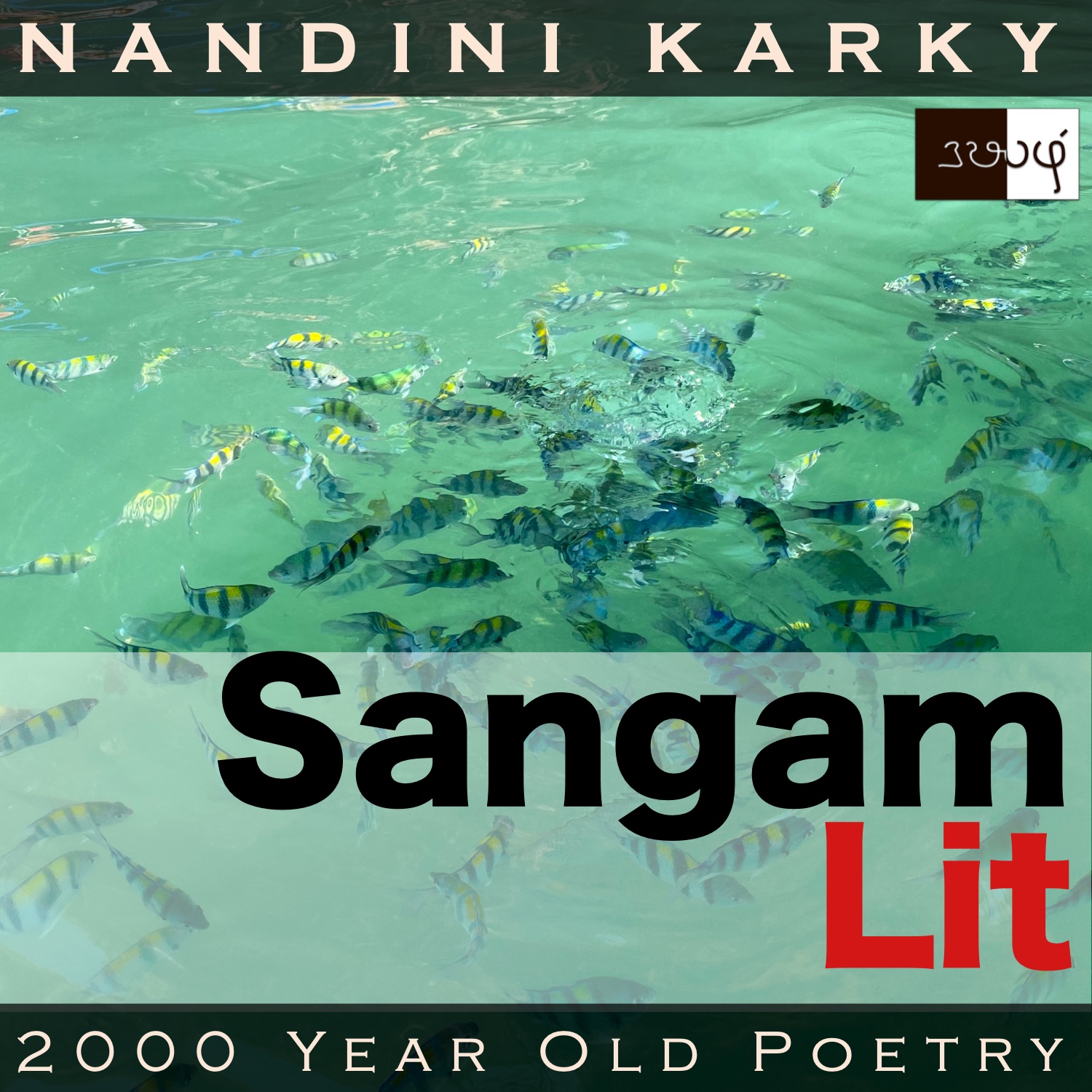Podcast: Play in new window | Download
Subscribe: Apple Podcasts | Spotify | Amazon Music | Android | iHeartRadio | TuneIn | RSS | More

In this episode, we perceive plant and animal life in a farmland as well as the generous and war-seeking nature of a king, as portrayed in Sangam Literary work, Kurunthogai 91, penned by the famous Sangam-age female poet, Avvaiyaar. Set in the agricultural regions of ‘Marutham’, the verse speaks in the voice of the lady to her heart, reprimanding it as it rushes towards the man, returning from the company of courtesans.
அரில் பவர்ப் பிரம்பின் வரிப் புற விளை கனி
குண்டு நீர் இலஞ்சிக் கெண்டை கதூஉம்
தண் துறை ஊரன் பெண்டினை ஆயின்,
பல ஆகுக, நின் நெஞ்சில் படரே!
ஓவாது ஈயும் மாரி வண் கை,
கடும் பகட்டு யானை, நெடுந் தேர், அஞ்சி
கொன் முனை இரவு ஊர் போலச்
சில ஆகுக, நீ துஞ்சும் நாளே!
Elements of life and life of a king is sketched in this one! The opening words ‘அரில் பவர்ப் பிரம்பு’ talks about ‘a type of tangled cane’ called as ‘rattan’, known for its use in making furniture, as well as this plant’s ‘fruit with lines on its outside’ in ‘வரிப் புற விளை கனி’. Providing company to the plant-life appears ‘carp’ fish in ‘கெண்டை’. Turning from this reality, the verse dwells on an abstraction in ‘பல ஆகுக, நின் நெஞ்சில் படரே’ meaning ‘much will be the angst in your heart’. Then, once again turning to tangible things, the verse talks about ‘மாரி வண் கை’ meaning ‘raincloud-like hands’, ‘கடும் பகட்டு யானை’ meaning ‘fierce male elephants’ and ‘நெடுந் தேர்’, referring to ‘tall chariots’. We learn that the character who owns these riches is none other than ‘அஞ்சி’, one of the famous patrons of the Sangam age. A ‘town at the edge of a battlefield’ soars before our eyes in the phrase ‘கொன் முனை இரவு ஊர்’. Ending with yet another parallel abstraction in ‘சில ஆகுக, நீ துஞ்சும் நாளே’ meaning ‘few shall be the nights you sleep’, the verse beckons our curiosity.
Fruits and fish, suffering and sleep – What a lot of thought in a few lines! The context reveals that the man and lady had been leading a married life when the man took to keeping the company of courtesans. Perceiving the man’s actions, the lady is filled with ire. Soon, the man realises the mistake in his ways and returns home to seek the lady’s pardon and win her good graces. Seeing the man, the lady’s heart jumps to welcome him. To her heart, the lady says, “The fully ripe fruit of the matted cane creeper, with a lined exterior, falls into the deep waters in the pond and is snatched by the carp in the cool shores of the man’s country. If you decide to be his wife, much shall be the suffering in your heart! Like the clouds that pour ceaseless rains, are the generous hands of ‘Anji’, who possesses powerful male elephants and tall chariots. Akin to the town that stands on the edge of his battlefield at night, few shall be, the nights you sleep!” With these words, the lady issues a stern warning to her thoughtless heart and advises restraint in the path of reconciliation with the man.
A classic case of separating oneself from one’s heart! Why does the lady take this step? Let’s unravel the deeper meanings in her words to understand. Pointing to a plant that abounds in their region, the lady paints for us, a ‘rattan’ cane creeper with twisted stems. From the stems, she journeys upwards to bring the fruits of the plant. As we are gazing at the exterior of this fruit with crisscrossing lines, the fruit falls down into the deep pond and in a moment, carp fish swirl around it and snatch it away. Saying such is the shore of the man’s land, the lady then tells her heart that if it decides to be a wife to the man, then much is the pain that awaits it. But, wait a minute, isn’t the lady already a wife to the man, so where is the question of deciding to be a wife now? It’s here the subtlety of that difference is revealed, for being a wife implies an acceptance of the truant man into her home, which was the lady’s to render or not! Until she renders that acceptance, it seems as if she can avoid being his wife even though she is his wife!
Turning our attention away from such domestic puzzles, the lady talks about King Anji, mentioning his generous hands, which shower upon the suppliants like the rainclouds that pour ceaselessly; his many fierce elephants and his tall chariots. Then, she talks about a town standing at the edge of a battlefield in which Anji is waging war at night, and concludes that like the people therein, the nights of sleeplessness will be many indeed, for her! In the earlier scene of the ‘rattan’ fruit falling into the pond and being snatched away by carp, the lady is placing a metaphor for how the man, who comes from a high birth, had fallen easily into the company of courtesans. And with that, the lady warns her heart saying that if it was so intent on rushing to him and forgiving him readily, he is going to fall like the ‘rattan’ fruit into the company of courtesans yet again soon, leaving her life, one of lonely suffering and her nights, that of sleepless yearning. Rendering unto us a wealth of information in two parallel layers, the verse also highlights the recurrent conflict in human lives where the deliberate reasoning mind decides to wage war on that instantly forgiving heart!




Share your thoughts...